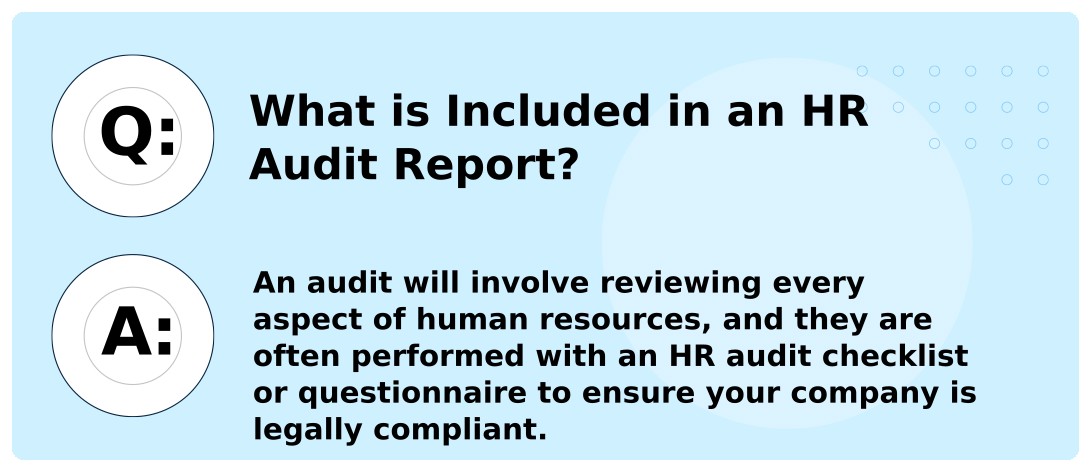
Employees are the foundation of any successful business, and the HR department ensures that every employee feels supported with whatever they may need. Depending upon business size and resources, a company may have an in-house HR team or choose an outsourced HR team to run those functions. Regardless of who is performing the HR role, a thorough HR audit is essential for reviewing the current state of the department’s operations at your business. We have put together this blog to explain the HR audit process and identify the opportunities where outsourcing this work could be the boost you need.
While there are a slew of different types of audits that can be performed, there is a standard cycle that you can expect any audit process to go through, which should give you an idea of how to prepare for an HR audit.
- Determine the type of audit being conducted and establish goals.
- Create the audit checklist or questionnaire.
- Perform the audit and collect the data.
- Benchmark the data and compare it to previous audits
- Deliver the results and feedback to the appropriate groups.
- Create a plan to make adjustments moving forward.
In the end, the main goal of an HR audit is to identify what is and isn’t working for your team. Then you can turn that information into an actionable plan that every team member can work on to improve your company culture and enhance HR processes.
What is Included in an HR Audit Report?

With rules and regulations constantly subject to change, regular HR audit reports ensure compliance is met. An audit will involve reviewing every aspect of human resources, and they are often performed with an HR audit checklist or questionnaire to ensure your company is legally compliant. While we cannot cover every item that should be included, the checklist can be broken down into sections such as:
- Regulatory & Compliance: A regulatory and compliance audit is going to evaluate whether a company is collecting the legally required information and forms. It is also going to make sure sensitive employee information is stored in a compliant manner. This audit will include but is not limited to: payroll records, backgrounds checks, FLSA, employment provisions, vaccine requirements, etc. Talent Acquisition Lifecycle: This audit will include but is not limited to: payroll records, background checks, Fair Labor Standards Act (FLSA), employment provisions, vaccine requirements, etc. Do the steps of the talent acquisition process meet the goals of the company? What changes need to be made?
- Total Rewards: Total rewards encompasses both benefits and compensation. The amount employees are being paid needs to be checked against national averages to ensure you are paying fair market value for your team. The company needs to understand what benefits are available and the usage rates of those benefits. The audit will also ensure that there is no disparity in pay for race, gender, disability, etc.
- Employee Relations and Engagement: The audit may tackle topics like employee engagement and diversity. Are the employees engaged at work? What company wide policies are affecting culture at work? What organization’s HR policies are affecting culture at work? Do we have a diversity and inclusion policy?
Importance of HR Audit
An HR Audit is required for an executive team to understand if their workforce goals and strategy are being reflected in HR practices and policy. Regular HR audits are crucial as they provide an ongoing assessment to ensure these goals remain aligned with company objectives. Its impossible to make changes unless you have an accurate assessment of your current position.
In addition to strategic importance, compliance can be an important aspect of an HR Audit. Noncompliance with employee laws and regulations or other HR mistakes can be costly. These mistakes can range from forgetting to properly pay an employee overtime to breaking health code laws. For example, remember that I-9 form we mentioned earlier? Well, violations related to these forms can cost $2,000 or more. With so much to check for, it has become more popular to outsource HR responsibilities to a third party. But which is more suitable for your company, an internal or external audit?
Internal vs. External HR Audit
The HR audit meaning and purpose will differ depending on whether it is conducted in-house or by an outside organization like Milestone. The major benefit of an internal audit is that it can be done inexpensively with existing resources.
If you choose to outsource for your HR audit, you will get an unbiased view from an expert in the field, and in many fields in the preferred type of audit to perform. It is worthwhile to get an accurate report that is unaffected by any relation to your team and its employees. In addition, its difficult for inhouse teams to audit compliance as they would need to deep dive into the latest compliance law. Here is a quick list of some of the more apparent benefits of an external audit.
- Keeps in-house teams from becoming overburdened
- Reveals opportunities to improve processes that an in-house may be blind to.
- Address compliance issues an in-house team may be blind to
- Saves time and money by identifying old processes slowing down productivity.
- Ensures performance management aligns with company goals and boosts overall productivity.
Take Away the Worry with Milestone
Our team is aware of the complexities that are associated with an HR department. Partnering with our team to manage those functions will free up your team to focus on the work at hand. We are experts, but we do not want to take over, rather, we want to partner with your team to create the best version of your company possible. We understand that surrounding yourself with knowledgeable people to grow your business is the best way to do it. Even in a small company, your people deserve the resources and support employees receive at larger companies. If you are ready to overhaul your HR functions, contact us today!
Related Content

HR Services For Nonprofits
Nonprofit human resources span a broad range of activities aimed at maximizing employee effectiveness while aligning with the organization's mission.

How To Resolve Conflicts In Remote Work Environments
In the digital age, managers face unique challenges when it comes to identifying and resolving workplace conflicts in remote settings.

Conflict Resolution In The Workplace
Effective conflict resolution facilitates a thriving organizational environment where challenges are viewed as opportunities for growth. Learn more here.
Stay in the know